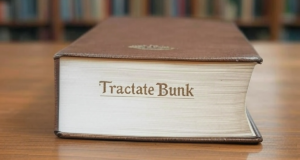“Everyone knows relations with the Arab world can’t happen unless and until we make peace with the Palestinians.”
 Jerusalem, January 22 – Critics of Israel’s politically embattled prime minister repeated their accusation today that the country’s unprecedented establishment of trade and diplomatic relations with those who long considered the Jewish State a sworn enemy serves only to distract from the international pariah status to which he has condemned Israel amid failure or refusal to reach a permanent peace agreement with the Palestinians.
Jerusalem, January 22 – Critics of Israel’s politically embattled prime minister repeated their accusation today that the country’s unprecedented establishment of trade and diplomatic relations with those who long considered the Jewish State a sworn enemy serves only to distract from the international pariah status to which he has condemned Israel amid failure or refusal to reach a permanent peace agreement with the Palestinians.
Leaders of the political Left and of the centrist party that again aims to oust Binyamin Netanyahu from the premiership he has held for more than a decade leveled the charge in various forums this week: press conferences, tweets, Facebook posts, online videos, and both print and broadcast advertisements. They characterized his successful pursuit of diplomatic relations with numerous states once sworn to Israel’s destruction a mere cover for his failures as a statesman, specifically the continuing absence of an agreement to grant even more control to a group that still encourages, lionizes, and pays its constituents to commit violence in the name of destroying Israel.
“The establishment of ties with Muslim countries that once upon a time wouldn’t even sit with us on the same international bodies is just a smoke screen,” declared MK Yair Lapid of the Blue and White Party. “Bibi is a diplomatic dud. He has nothing to show for all of his lame efforts to pretend we’re not isolated because of the Palestinian issue. Everyone knows relations with the Arab world can’t happen unless and until we make peace with the Palestinians. All the places establishing ties now don’t count because of that axiom. Barack Obama and John Kerry said so, and they’ve never been wrong about this region. And Jimmy Carter!”
Pre-election rhetoric toward the next parliamentary contest this March remains low-key, but analysts expect the charge to feature more and more as it draws nearer and the discourse heats up accordingly. An electorate suffering from campaign fatigue has so far shown little responsiveness to the familiar tactic; the March vote will mark the third time in less than a year that Israel has gone to the polls. The two previous occasions, in April and September 2019, produced a political stalemate in which neither major bloc of parties could cobble together a majority coalition. Campaign strategists to the left of Likud hope the isolation trope plus the prime minister’s indictment on corruption charges plus a fortuitous alignment of Saturn with Mars will sway the voters away from his bloc.
Please support our work through Patreon.




